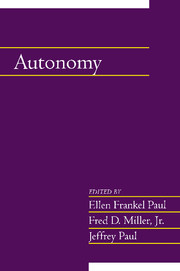Book contents
- Frontmatter
- Contents
- Introduction
- Acknowledgments
- Contributors
- Stoic Autonomy
- Autonomous Autonomy: Spinoza on Autonomy, Perfectionism, and Politics
- Kant on the Theory and Practice of Autonomy
- How Much Should We Value Autonomy?
- Autonomy, Duress, and Coercion
- Autonomy and Hierarchy
- Reason and Autonomy
- Identification, the Self, and Autonomy
- Some Tensions between Autonomy and Self-Governance
- Autonomy from the Viewpoint of Teleological Behaviorism
- The Paradox of Group Autonomy
- Abortion, Autonomy, and Control over One's Body
- Freedom as a Political Ideal
- Index
Kant on the Theory and Practice of Autonomy
Published online by Cambridge University Press: 06 July 2010
- Frontmatter
- Contents
- Introduction
- Acknowledgments
- Contributors
- Stoic Autonomy
- Autonomous Autonomy: Spinoza on Autonomy, Perfectionism, and Politics
- Kant on the Theory and Practice of Autonomy
- How Much Should We Value Autonomy?
- Autonomy, Duress, and Coercion
- Autonomy and Hierarchy
- Reason and Autonomy
- Identification, the Self, and Autonomy
- Some Tensions between Autonomy and Self-Governance
- Autonomy from the Viewpoint of Teleological Behaviorism
- The Paradox of Group Autonomy
- Abortion, Autonomy, and Control over One's Body
- Freedom as a Political Ideal
- Index
Summary
INTRODUCTION
We all know what Kant means by autonomy: “the property of the will by which it is a law to itself (independently of any property of the objects of volition)” (G, 4:440), or, since any law must be universal, the condition of an agent who is “subject only to laws given by himself but still universal” (G, 4:432). Or do we know what Kant means by autonomy? There are a number of questions here. First, Kant's initial definition of autonomy itself raises the question of why the property of the will being a law to itself should be equivalent to its independence from any property of objects of volition. It is also natural to ask, how does autonomy as Kant conceives it relate to more familiar notions of freedom. For example, consider Locke's conception of freedom as the condition of a person “to think, or not to think; to move, or not to move, according to the preference or direction of his own mind,” rather than according to the preference or direction of any other person. What is the relation between autonomy and this traditional conception of freedom as the liberty of an agent? And what is the relation of autonomy to the traditional conception of freedom of the will; that is, the condition that obtains, as G. E. Moore puts it, if, “wherever a voluntary action is right or wrong … it is true that the agent could, in a sense, have done something else instead,” or in Kant's own terms, “freedom in the transcendental sense, as a special kind of causality … namely a faculty of absolutely beginning a state, and hence also a series of its consequences” (PureR, A 445/B 473)?
- Type
- Chapter
- Information
- Autonomy , pp. 70 - 98Publisher: Cambridge University PressPrint publication year: 2003
- 7
- Cited by



